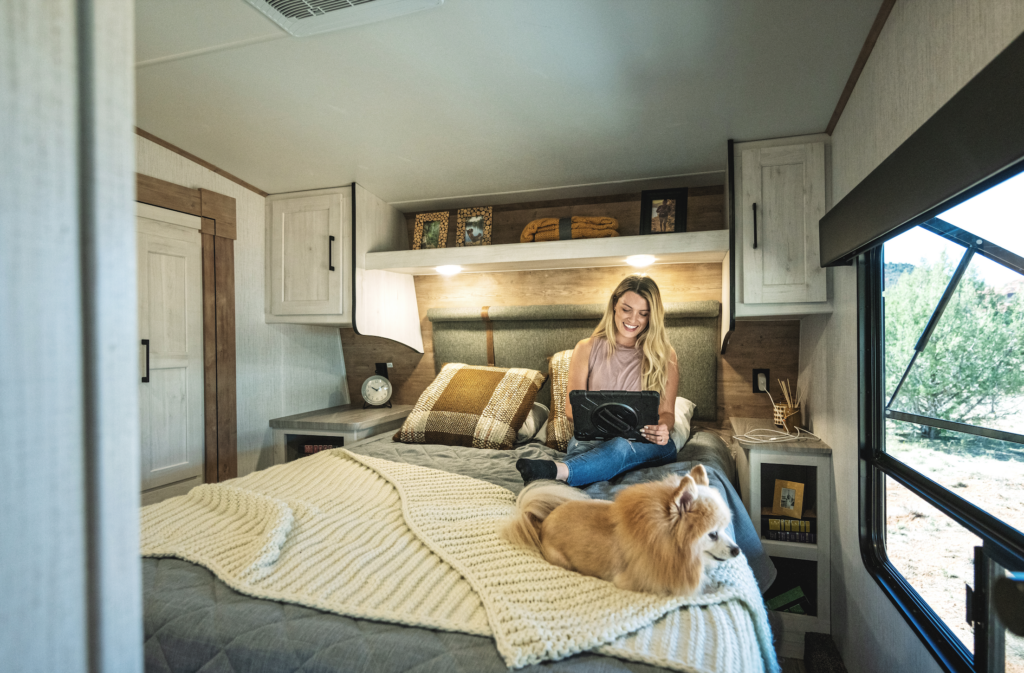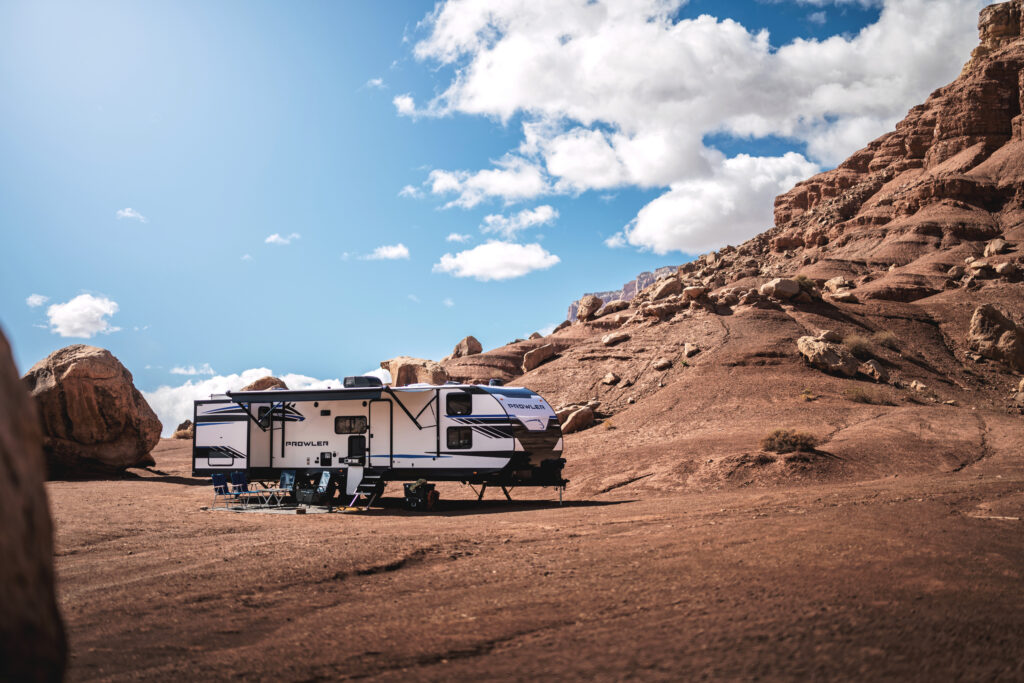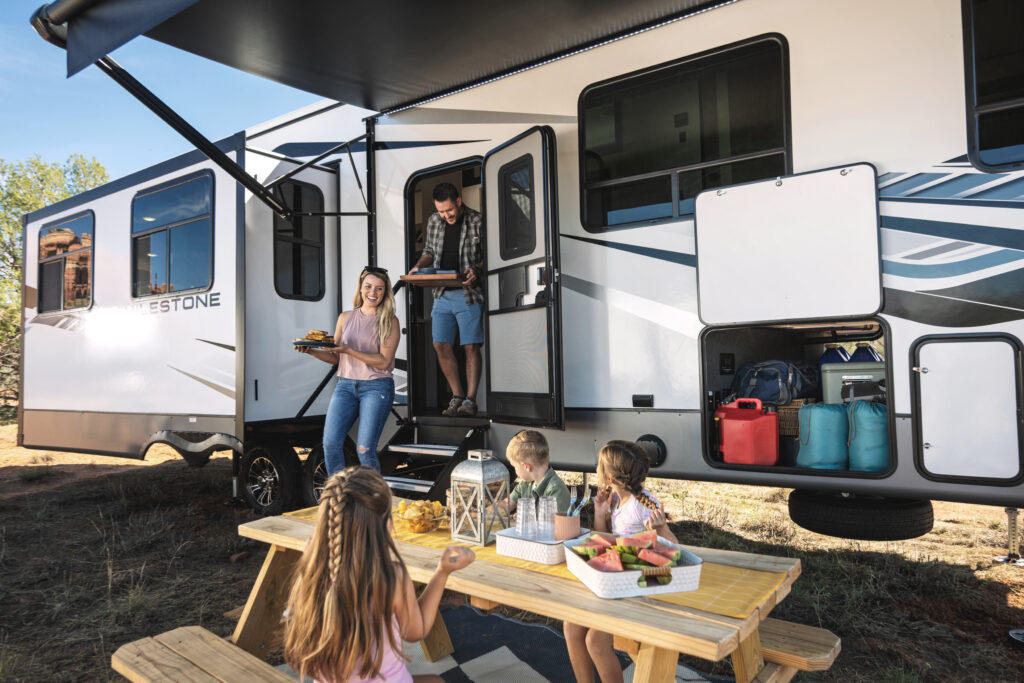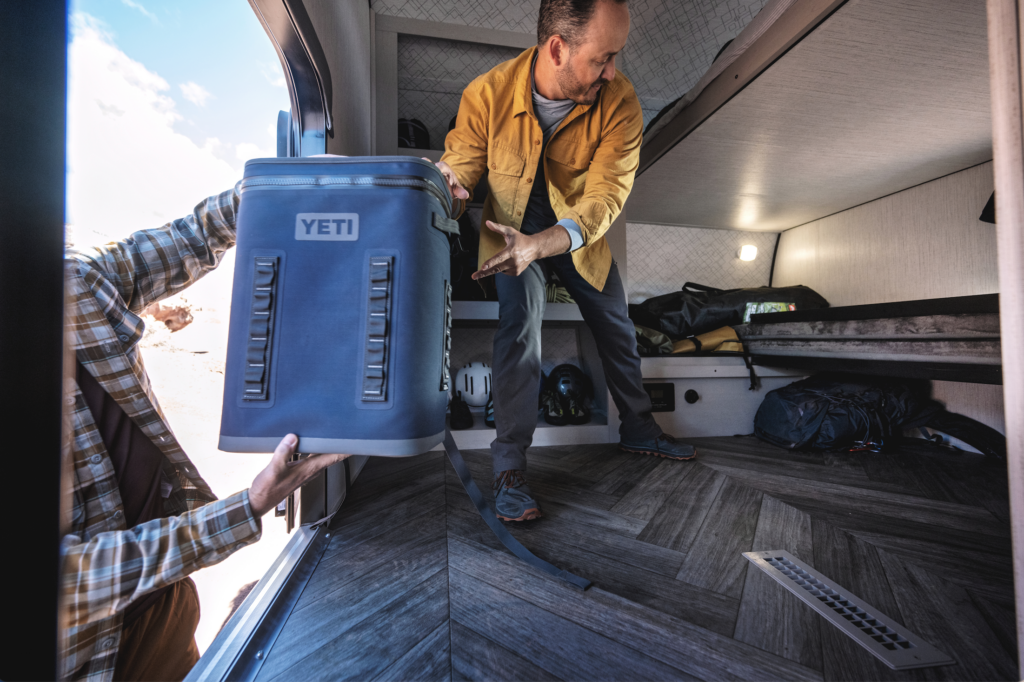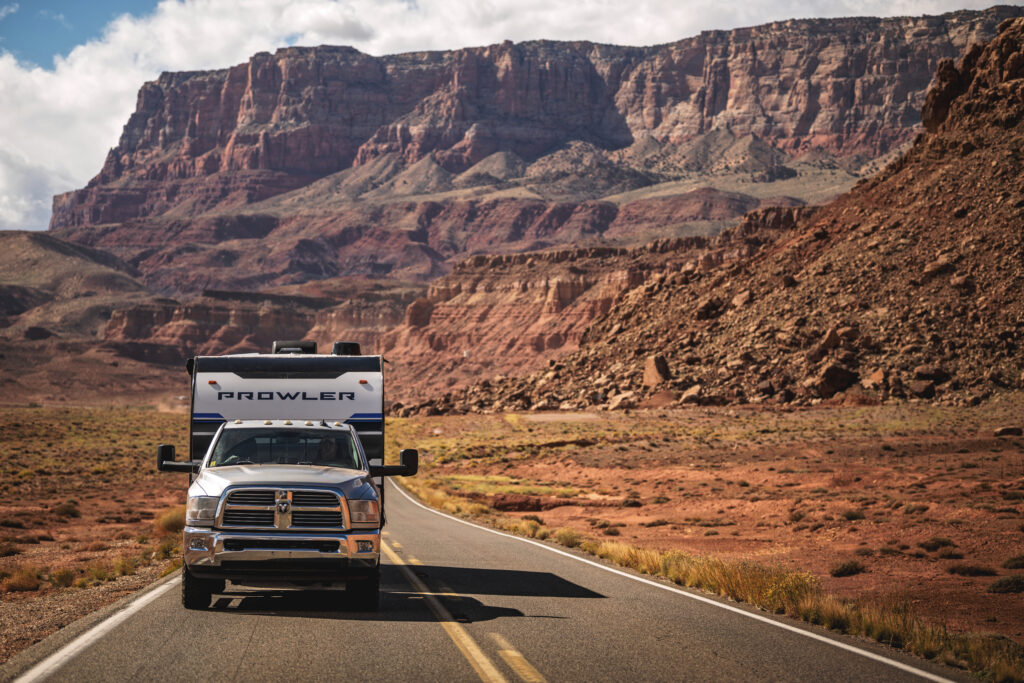How To Plan The Best RV Road Trip Of Your Life
If you live in the U.S., you’ve probably taken plenty of road trips in your life. With so many notable places to visit, traveling by road can be a wonderful and easy way to have adventures. But if this is your first time planning an RV road trip, you might be fuzzy about the finer points of planning it right. We’re happy to help. Below, we’ll walk you through how to plan the best RV road trip of your life. We’ll give you tips on what special considerations you should pay attention to, and share our tricks for dealing with unexpected challenges that inevitably pop up. Ready? Let’s go.
When to Start Planning Your RV Road Trip
When should you plan your trip? In general, start planning early. But it depends on where you’re going, the specificity of your plans, and the length of your vacation. For example, if you’re traveling in the off-season, you’ll have more flexibility than if you want to book a highly-rated campground in the middle of summer.
In most cases, the earlier you can start planning, the better. Campgrounds open their books to reservations on different timelines – sometimes you can book up to a year in advance, sometimes six months, and sometimes only 90 days in advance. If you know you want a specific campground on a specific date, your best bet is to be ready to book the day their reservations open for that time period.
We recommend getting a general idea of where you want to go and which campgrounds you want to book at least six months in advance, and up to a year in advance when you can. That gives you plenty of time to look at campground reviews and book the more competitive ones, and then fill in the rest of your trip with plenty of time to spare.
So for example, let’s say you know you want to spend your 50th birthday at Yellowstone National Park. You plan to stay at Fishing Bridge RV Park, the only campground with full hookups inside the park. They allow you to reserve campsites up to 13 months in advance, and the competition will be stiff. Your best bet is to book when they open up the dates you need, even if you’re not quite ready to book the less-competitive legs of your trip.
Know Your Specifications and Limitations
RV Specs and Limitations
Driving or towing a rig means you have a whole other set of considerations than you would if you were driving just a car. Ensure you know your RV’s specifications exactly, including the model year, length, height, dry weight, and the amount of weight you can add with cargo. Height is important for ensuring you can clear any overpasses that you encounter on your route, especially back roads that may have older infrastructure.
The length of your RV may determine which campsites you can book, like whether you can use a back-in site, or you’ll need a pull-through site. Or whether the campsite itself is long enough to contain your coach. Some campgrounds, particularly fancier RV resorts, may have limitations on the age of your RV, requiring it to be newer than 10 years old, for instance. Both dry and loaded weights will affect the tow vehicle you can use, and your RV will need to comply with weight ratings for the road you travel.
In addition, if your RV weight is close to the limit of what your tow vehicle can handle, you may have trouble getting through specific terrains. The last thing you need is a truck engine that overloads while you’re pulling your RV up a mountain. If your weight is cutting it close, you may need to plan a different route to your destination, change your destination itself, or make plans to rent a higher-powered tow vehicle for the trip.
Camping Style and Limitations
There’s also a huge difference between boondocking miles away from the nearest town and staying at a luxury RV resort, in terms of how you should prepare. If you love booking RV resorts, you can expect to have standard access to full electric, water, and sewer hookups. That will make the size of your tanks and the capacity of your batteries less important than for someone who wants to camp fully off-grid for a longer period of time.
Boondockers will want to know the size of their fresh water, gray water, and black water tanks. They should know the amount of electricity they can expect to draw from their batteries or generator in a day, and the capacity of any solar energy systems installed onboard. Because dry camping leaves less room for error, being overprepared becomes more important than it is for someone camping at a full-service campground where any surprises can be dealt with more easily.
Personal and Family Limitations
You’ll want to consider any age-related, physical, or personal limitations, too. Traveling with young kids or a larger group of people, you should expect to travel more slowly than two adult RVers who can be more nimble in their planning and setup. If you or your travel partners have any physical limitations, you’ll want to take these into consideration, too. For example, if you use a CPAP machine, you’ll want to ensure you always have enough electricity to get through the night. Mobility issues can be lessened by choosing campsites near campground amenities or planning to bring an alternate form of transportation, like a bicycle or golf cart. Is your night vision not very good? Then your plan should include driving during daylight hours, with an emergency plan in case you can’t make it to your destination before dark.
Honor Your Budget
Unless you have an unlimited budget for travel (you lucky duck), your budget will influence how you plan your trip. There are campgrounds at a wide variety of price points, from functionally free to luxury resort rates. Gas costs can be significant, especially if you haven’t taken into account the way the weight of your cargo affects your gas mileage. And while there are tons of free attractions you can access with some planning, you may want to splurge on specific destinations.
We recommend planning your most expensive stops first. If you’re taking your RV to Disney with the grandkids, plan those costs first, and then figure out how to economize on the way there or back. If you have your heart set on eating at a specific fancy restaurant to mark a special occasion, look for less expensive campsites to maximize the rest of your budget.
Plotting Your Destinations
From Point A to Point B
Like budgeting, we recommend planning your major destinations first and then filling in the stretches between. For example, let’s say you’re starting in Chicago and your main destination is Nashville. Once you’ve got that set, you can plan your stops along the way, focusing on how much time you want to spend driving each day, and how much time you want to stay at each campground.
Breaking It Up
Driving with an RV tends to take longer than traveling by car. Some people recommend rules like 2/2/2 – drive no more than 200 miles per day, stop every 2 hours, and get to your destination by 2 p.m. They might also add that you should stay at your destination for at least two days to get the most out of your journey.
So if you have 10 total days to go from Chicago to Nashville and back, you can start by breaking down the mileage into easy stretches. At just under 500 miles one way, you might decide to take three days to get down to Nashville, spend four days there, and spend three days getting back. Or maybe you’ll decide you want to spend more time at those in-between destinations, covering the same mileage with five total days of driving and five total days spent exploring each stop.
Useful Tools for Planning
Apps like Google Maps, Roadtrippers, RV Life Trip Wizard, The Dyrt, Hipcamp, and Campendium can help you plan your route and destinations. When you’re on the road, apps like Gas Buddy, iExit Interstate Exit Guide, RV Dump Stations, AccuWeather, and Yelp can help you find stops along your route, keep on top of weather developments when you’re traveling, and find dump stations along the way.
Mix Up Your Stops
If you agree that “the journey is the destination,” then every opportunity to stop along your route becomes an invitation to expand your adventure. And stepping outside your usual routine can yield big rewards.
You know you’ll need to buy food. Instead of just going to a grocery store, look for roadside farm stands, farmers’ markets, and specialty markets along the way. You may find varieties of local produce you’ve never seen before or regional brands you’ve never heard of. If you’re a parent who believes in educational stops at museums, switch it up and delight your kids with a pit stop at the world’s biggest hammer in Eureka, California. Rather than grabbing lunch at a rest stop, why not take an extra hour and find a locally-owned restaurant serving food you haven’t tried before? Even experiences that don’t turn out as planned can become memories your family will talk about for years.
Have a Plan for Unexpected Stops
Whether you blow a tire, have to take a kid to urgent care for stitches, or just encounter extreme road work delays, challenges just happen. It’s always a good idea to pad your schedule with a bit of extra time so you’re not rushing to get to your campsite before dark. That way, you can absorb surprise stops without stressing too much.
Also, make sure you have access to a downloaded alternate route or an atlas – especially in locations where WiFi is spotty. Routes you were counting on may have weight limits you can’t meet or poorly maintained roads that are rough on your coach. And never try to drive under bridges or underpasses if you’re unsure you can make the clearance – back up and find another way. The extra travel time is 100 percent worth not having to deal with a disaster.
You should also have a list of places you can camp overnight in a pinch if you can’t make it to your campsite for some reason. Truck stops, Bureau of Land Management (BLM) land and some local city parks will let you stay overnight in your RV for free or for a small fee. Many nationwide chain businesses also allow RVers to stay overnight. Walmart, Cracker Barrel, Bass Pro Shop, Cabelas, Lowe’s, Home Depot, Costco, Sam’s Club, Planet Fitness, and Anytime Fitness have been known to let RVers park overnight for free. Just make sure that you confirm with the business itself that you’re allowed to stay so you don’t break any local laws. Also, Love’s Travel Stops have introduced a number of locations where you can pay to park your RV overnight with full hook-ups and classic campground amenities. (Learn more about Love’s new development on our podcast episode.)
Finally Hitting the Road
Once you’ve done all your planning, it’s time to get in your tow vehicle and go. Just remember, being open to new and unexpected experiences can make even the most routine trip memorable. So what if you have to skip a stop along the way? There are hidden treasures all around us just waiting to be discovered.
Here are a few more random tips to help you plan your next trip:
- If you’re hoping to get a spot in a first-come, first-served campsite, get there early. Like at the crack of dawn, when the early birds are checking out for the day.
- Get creative with where you source your campsites. Check Harvest Hosts, Airbnb, and VRBO for privately owned land you can camp on.
- Take something mundane and turn it into a family tradition. Play the same song every time you leave one campground and head to another. Hold a contest to see who can find the weirdest snack in a convenience store. Buy postcards in every town you visit. Make it a point to meet every cool dog at a campground and vote on which one had the most original name.
- Road trips don’t have to cover a lot of ground to be worthwhile. When you travel slower, you can do more things at every destination, and discover the local businesses most tourists miss.
- If you’re taking a new RV on its first road trip, pick somewhere close to home and close to civilization. That way, if anything goes wrong, there will be stores nearby to buy what you need or you can head home early to troubleshoot before a longer trip.
- Don’t be afraid to pick a theme for your trip. If you’re interested in military history, make it a point to visit battlefields, air museums, or retired Navy boats along your way. If your family loves movies, plan your trip around landmarks and towns from some of your favorite films. Love the supernatural? Look up a list of mythological creatures for where you’ll be headed (like the Chupacabra or Mothman) and see how many cryptozoology museums you can find near your route.
- And most of all, have fun, drive safely, take pictures, and make new friends along the way. Bon voyage!



